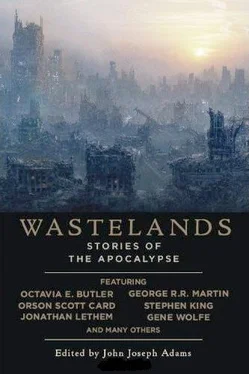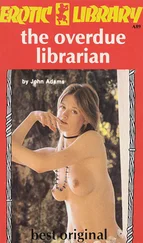Music had once been his life. Now his greatest aim was only to quiet the rumbling of his belly. Then he remembered—his eyes drifted to the hammer he had found in the rubble that day—and his hope came alive again, as it had weeks ago.
But there was no time to daydream, no time for hoping. There was time before he slept only to clean and skin the rats he had caught. Tomorrow he was to go trading with the Tumbledown Woman.
The Tumbledown Woman and her mate lived in the midst of a hundred decrepit trams in an old depot. Why they chose to live there was a puzzle none who traded with her had ever managed to solve. Here she stayed, and here she traded. Her store counter was a solitary tram left on the rails a few meters outside the depot, its paint peeling away but still bearing pathetic advertisements of a lost age. While the outside of the tram offered far-away holidays and better deodorants, the Tumbledown Woman inside traded garbage as the luxuries of a world which had died. Inside, arrayed along the wooden seats or hung from the ceiling were tin cans with makeshift hand-grips, greasy home-made candles, racks of suspect vegetables grown no one knew where, rows of dead rats, cats, rabbits and the occasional dog, plastic spoons, bottles, coats of ratskin and all sorts of items salvaged from the debris of oft-looted shops.
The Tumbledown Woman was old, and she was black, and she was ugly, and she cackled when she saw Parnell approaching slowly in the chill morning. She had survived better than many men through the crisis, by being more ruthless and more cruel than they had ever managed to be to her in the years before. She rubbed her hands together with a dry, dry sound, and greeted Parnell with a faded leer.
“Two rats, Tumbledown Woman, fresh killed yesterday,” he opened without hesitation.
“I give you something good for them, Mr. Piano Player,” she said.
“Then that will be the first time ever. What?”
“A genuine diamond ring, twenty-four carat gold, see!” And she held the flashing gem to the sun.
Parnell didn’t bother to smile at her taunt. “Give me food, and be done with your mocking.”
She sneered, and offered him a cabbage and two carrots. Nodding, he handed her the skinned corpses, lodged the food in his bag, and turned to go. But he was carrying the sledgehammer at his side, and she stopped him with a yell. “Hey, piano player man, that hammer! I give you good fur coat for it! Genuine rabbit!”
He turned and saw that she was not mocking him this time. “When I’ve finished with it, maybe. Then we’ll see.”
His reply seemed to make her pleased, for she grinned and yelled again: “Hey, piano man, you hear the news about Ol’ Man Edmonds? Them Vandalmen come an’ kill him, burn down that book place Ol’ Man Edmonds live in!”
Parnell gasped in shock. “The Library? They burnt the Library down?”
“That’s right!”
“My God!” He stood, silent and bewildered for a long minute as the Tumbledown Woman grinned at him. Then, unable to speak further in his anger, he clamped his hands together in bitter frustration and walked off.
The sledgehammer was an awkward thing to carry. Slipped into his belt with the metal head at his waist, the wooden handle beat at his legs as he walked. If he carried it in his arms, his muscles protested after no more than a few minutes, and he was forced to rest. He was getting old, and he knew it. The slide to death was beginning to steepen and he was not, he thought, very far from its end.
In slow, weary stages he walked the distance into the heart of the corpse that was the city: Long ago its pulse had stopped. He walked past the rusty hulks of cars and along the dust-filled tram-tracks, through streets of shattered buildings standing in rows like jagged reefs. Long ago the lungs of the city had expired their last breath; the tall chimneys were fallen, casting scattered bricks across the road before him.
He came at last to the centre and faced again the strongly barred and sealed doors of the old City Hall, half buried in the rubble of its long-crumbled entranceway.
Even if he had been able to break open the bars of the door, he would have needed to clear away the rubble to allow the doors to open. Such was beyond him.
But at the side of the building, the skeleton of a truck lay crazily against the wall, mounted on the pavement and nuzzled face to face with a tree that now made a leafy wilderness of the cab.
Parnell climbed onto the truck and carefully ascended until he perched with little comfort on a branch of the tree, close to a barred window. Three weeks ago he had cleaned away the grime on the glass to see the dusty corridors inside. On the far wall of the corridor was a direction sign, faded and yellowed, but still bearing the words: CONCERT HALL.
Once again, looking at that dim sign, he was filled to overflowing with memories of concerts he had given. His hands followed a memory of their own on the keys, the music spiralled and, after, the almost invisible audience in the darkened hall applauded again and again…
His memories vanished as he swung the sledgehammer from his shoulder, jarring it into the bars of the window. Dust showered and cement crumbled. The task looked easier than he had at first thought, which was fortunate, for the one stroke had weakened him terribly. He swung again, and the bars moved and bent. Somehow, he found the strength for another swing, and the bars buckled and came loose and smashed through the glass into the corridor beyond.
Triumph came to him in a cloud of weakness, leaving him gasping and his arms weak and trembling. He sat for a long moment on the branch, gaining strength and hope to venture within.
At last he swung his legs over the edge and dropped onto the corridor floor. Glass crackled. He reached into his bag and brought out a small candle and some precious matches. The box of usable matches had cost him ten rat skins at the Tumbledown Woman’s tram two weeks ago. He lit the candle and yellow light flooded into the dusty corridor.
He walked along it, making footprints in the virgin dust. A memory floated back to him of telecasts of moon explorers, placing footprint after footprint in age-old lunar dust, and he smiled a grim smile.
Eventually he came to a set of double doors, barred and padlocked. Here he was forced to rest again before he could smash the lock with his hammer, and step into the space-like blackness beyond.
After his eyes had adjusted to the light of the candle, dimmed by the open space, he saw row upon row of once plush seats. Somewhere a rat scurried, and above he could hear the soft rustle and squeaks of what might be a brood of bats on the high ceiling.
The aisle stretched before him, sloping slightly downwards. Parnell walked forward slowly, kicking up dust. In the dark immensity of the hall, his candle was just a spark, illuminating only a tight circle around him and filtering through puffs of dust stirred by his passage.
On the stage, metal gleamed back images of the candle flame from scattered corners. Around him were the music stands and music sheets of a full orchestra, filmed with years of dust. Here was a half-opened instrument case, and in it the still-shining brass of a French horn, abandoned by some long-gone performer in forgotten haste. And shrouded in white, topped by a tarnished candelabra, stood the grand piano.
Parnell’s heart began a heavier, more rapid beat as he brushed dust from the sheet covering the piano. With an anxious hand he lit the candelabra with his own meagre candle, and lifted it high as the light swelled across the stage. He could see other instruments now, long lost by their players: here a violin, there an oboe, cast aside by a time that had made their possession unimportant.
Placing the light on the floor, he carefully eased the sheet from the piano. Yellow light danced on the black surface of polished wood and sparkled in the brass.
Читать дальше












